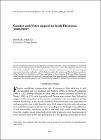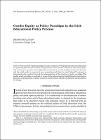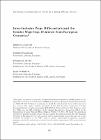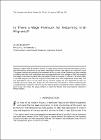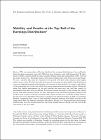Browsing Economic and Social Review by Subject "Gender"
Now showing items 1-6 of 6
-
Gender and voter appeal in Irish elections, 1948-1997
(Economic & Social StudiesDublin, 2000)In general elections in the Republic of Ireland 1948-1997, female candidates have received on average a lower proportion of first-preference votes than males. This disparity between male and female candidates is worsening ... -
Gender equity as policy paradigm in the Irish educational policy process
(Economic & Social StudiesDublin, 1999)The construct of policy paradigm is used to analyse how the proposition that Irish education is a gendered phenomenon has been conceptualized, communicated, reflected in educational policy and acted upon in practice. ... -
Inter-industry wage differentials and the gender wage gap: evidence from European countries
(Economic & Social StudiesDublin, 2007)This study analyses the interaction between inter-industry wage differentials and the gender wage gap in six European countries using a unique harmonised matched employer-employee data set, the 1995 European Structure of ... -
Ireland: a man?s world?
(Economic & Social StudiesDublin, 2000)This article starts from the position that gender is crucial in understanding Irish society. Using Connell?s concept of the patriarchal dividend, and drawing on a variety of relevant literature, it explores its existence ... -
Is there a wage premium for returning Irish migrants?
(Economic & Social StudiesDublin, 2001)Higher rates of economic growth in recent years have led Ireland from being a country characterised by emigration to one where population inflows have become an important issue. This paper contains an analysis of one ... -
Mobility and gender at the top tail of the earnings distribution
(Economic & Social StudiesDublin, 2006)The increasing share of the top fractile in the earnings distributions of several Anglo- Saxon heritage economies since the 1970s has been dramatic, and well documented. To date, however, little is known about the ...




